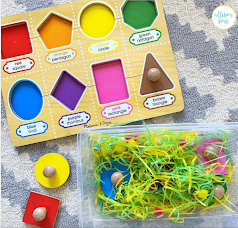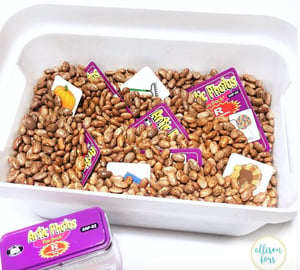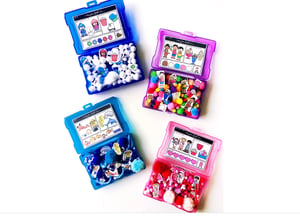.png)
Sensory Hacks for Speech and Language Therapy
Sensory play is an underutilized activity in speech therapy – use sensory bins, sensory bottles, and more to stimulate language, social skills, and motor skills!
Why is sensory play important?
I am a firm believer that sensory play is beneficial for all children. We know children, especially young children, learn best through hands-on exploration to learn about the world around them. Sensory activities help the brain focus, self-regulate, reduce distractions, and build neural connections to learn and retain information. Sensory stimulation is critical for little brains to develop and strengthen sensory-related synapses and functions!
Sensory exploration allows us to provide language stimulation in a meaningful context and create functional learning opportunities. Teaching functional language in a natural way is crucial for early language development. In addition, sensory play is fun and keeps children engaged and motivated! It takes the focus off of the articulation or language targets – making therapy feel less like work, and improving carry-over skills!
Many children with sensory processing disorder (SPD) also receive speech therapy services. SPD is particularly common in children on the autism spectrum. In fact, research has found that 78 percent of autistic children present with sensory difficulties. [1] By understanding and helping a child with their sensory needs, we can make further progress. Children with SPD may be hesitant to touch things like shaving cream or squishy sand – this is normal. Be sure to ease them into the concept of sensory play and have them watch you or a parent play with the sensory item.
What can Sensory Bins target in Speech?
LANGUAGE
- Vocabulary Expansion: Playing with a bin or bottle is the perfect opportunity to bring some new descriptive words into their vocabulary. Use your own words to describe what they’re playing with and have them do the same. (ex. squishy, sweet, soft, shiny, rough, scratchy)
- Sentence Fluency: Encourage the child to communicate with you about what they are doing – or want to do – in full sentences rather than brief phrases. (ex. If you ask what they are playing with and they say, “play dough,” you can respond with, “You are playing with the play dough.” Then, ask further questions to promote longer responses, such as “What are you doing with the dough?”)
- Question Comprehension: Ask a mix of open-ended and yes/no questions to improve comprehension and response. (ex. “How does it feel in your hand?” or “Do you want to shake the bottle?”)
- Following Directions: Work on giving commands that require the child to identify the objects and follow directions. As they build confidence and success, begin to give more complex commands with multiple steps. (ex. “Pick up the play dough and stretch it.” or “Pour the water into the sand.”)
- Inferencing: Ask them to make observations and draw conclusions based on what they see. (ex. “Which of these tools should you use to stir?” or “What happens when we mix the red and blue sand?”)
LIFE SKILLS AND SOCIAL SKILLS
- Pretend Play: Sensory play makes for great pretend play! There are no rules or expectations for playing with things like water beads or sand! Have fun with expressive language skills by encouraging imagination. (Ex. Ask what they are doing if they’re already playing on their own or encourage them to pretend by assigning names and personalities to the cars you’re playing with.)
- Self-Regulation: Sensory play is a great way to calm an anxious or frustrated child. They also are great opportunities to learn about self-control. A child must follow the rules – no eating the shaving cream, no throwing the rice, taking turns, sharing. These rules are set in place to keep us safe but are also teaching a child how to have self-control.
- Problem-Solving: Many wonderful problem-solving opportunities arise in sensory play. Wait for the child to ask for help or ask a question. Watch them discover new textures or items and how they work and interact together. Many language opportunities come with problem-solving and inferencing skills!
FINE MOTOR AND GROSS MOTOR SKILLS
- There is a lot of scooping, pouring, and manipulating different items and textures that happen in sensory play. You can incorporate fine motor tasks – like picking things up with big tweezers or cutting playdoh.

Materials Needed for Sensory Bins
- The Basics
- Plastic Bin - These are what I prefer! I love the ones that clasp close for easy storage and ensuring nothing falls out of the bin.
- Basket
- Old Shoebox
- Pencil Box
- Metal Tray
- Fillers
- Dry Beans
- Rice
- Kinetic Sand
- Instant Snow
- Pom Pom Balls - I usually introduce sensory bins with Pom Pom balls so it ensures less mess.
- Water Beads
I also like to include some fine-motor tools like tongs, tweezers, and scoopers. I love the Learning Resources brand for these things! All sensory bin items can be found on Amazon, Hobby Lobby, Walmart, Dollar Tree, really anywhere!

Sensory Bins have become a favorite tool of mine to use in therapy because they are so effective to keep little hands and minds busy, and they keep things fun! I hope you have gained some ideas from this post to use in your next speech session!

Author: MaKayla Stubblefield, M.S., CF-SLP
References:
[1] Miller, L.J., S. Schoen, J.Coll, B. Brett-Green, and M. Reale. Final report: Quantitative psychophysiologic evaluation of Sensory Processing in children with autistic spectrum disorders. Los Angeles, CA: Cure Autism Now, February 2005.
[2] Allisonfors. (2021, January 29). Why you should be using sensory bins in speech therapy. Allison Fors, Inc. Retrieved October 10, 2022, from https://allisonfors.com/using-sensory-bins-in-speech-therapy/
Disclaimer: The information provided in this blog is for general informational purposes only and should not be considered as professional advice. The content is based on the author's personal experiences, research, and opinions. It is always recommended to consult with a qualified professional or expert before making any decisions or taking action based on the information provided in this blog.
